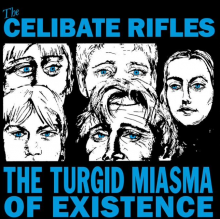Submitted by roberto on

Dopo "Roman Beach Party", sono felice di avere contribuito a ristampare - dopo quasi quarant'anni - il terzo e per molti miglior album dei Celibate Rifles.
"The Turgid Miasma of Existence", pubblicato originariamente da Hot Records nel 1986, vede ora la luce per Area Pirata, rimasterizzato, in una lussiona edizione in vinile 180 grammi.
Queste le mie note di copertina, allegate al disco.
THE TURGID MIASMA OF EXISTENCE: THE CELIBATE RIFLES AT THEIR BEST
“The Turgid Miasma of Existence”, the third Celibate Rifles album, is probably the highest point of their career. It was released in June 1986 after a handful of singles and two albums ("Sideroxylon" and "The Celibate Rifles" aka "Five Languages") which highlighted the band extraordinary creative force in the previous years.
After some adjustments in the line-up, for "Miasma" the Rifles are: Damien Lovelock on vocals, the twin-guitar attack of Kent Steedman and Dave Morris, and the rhythm section comprised by Phil Jacquet on drums and Mike Couvret on bass with the latter particularly involved in the writing process too, alongside Steedman and Lovelock.
However, the recordings were not so simple, as Steedman recalls: “We started recording in the Alberts Studios, where a lot of AC/DC and Rose Tattoo albums were made, then there was an issue with the accounts department and our label, so we had to copy the tapes and go to another studio. It became a challenge and it was much more expensive for us as we had to pay to finish it, not the label. So it was more rushed than we wanted. It turned out OK, but could have sounded a lot better”.
We can’t imagine how a record like this could sound better, perfectly balanced as it is between the overwhelming force of punk numbers and more relaxed and psychedelic tunes. The opener Bill Bonney Regrets starts with a guitars/bass sonic assault before turning into some kind of nocturnal poetry with the voices of Damien and Kent reciting rather than singing. The song’s title can be somehow misleading: Bill Bonney is not the legendary outlaw Billy The Kid but a university lecturer with whom Lovelock – it’s Steedman recalling again - "had long conversations which led him to open up to contemplation and to explore different points of view. The song is an early observation of the drudgery of life and expectations, what it can turn into something else”. Other aggressive songs are Conflict of Instinct and Temper Temper Mr. Kemper, the latter based on the story of an American serial killer called Edmund Kemper. The album finds its beauty in the songs diversity, with a slight prevalence for the fast and impactful numbers among which it is impossible not to mention the contagious Sometimes, the gritty bass-fueled Some Kind Of Feeling, and JNS, a tune co-written with their former bass player James Darroch, whom the album is dedicated to: he died in a car accident, at the age of 25, while “Miasma” was being recorded.
Then - and this is a peculiarity of the Rifles style - the band suddenly moves towards moods and atmospheres playing psychedelic slow numbers such as Sentinel, Glasshouse, the magnificent electro-acoustic ballad No Sign or the closer New Mistakes’ fascinating lysergic trip.
Upon its release “The Turgid Miasma of Existence” received rave reviews including Rolling Stone’s critic David Fricke who wrote: “At a time when most punk outrage is just witless spleen at 90 mph, these Aussie spitfires have fired off a release that shakes with lyric force and experimental valour, not just speed and volume”. It’s a perfect description for a legendary album which, after almost forty years, finally returns to shine on vinyl in all its glory.
